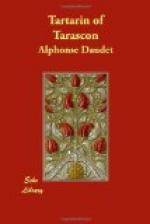This required consideration. The caravan halted, and held a council in the broken shadow of an old fig-tree.
“It’s my advice that we turn up Negro porters from this evening forward,” said the prince, trying without success to melt a cake of compressed meat in an improved patent triple-bottomed sauce-pan. “There is, haply, an Arab trader quite near here. The best thing to do is to stop there, and buy some donkeys.”
“No, no; no donkeys,” quickly interrupted Tartarin, becoming quite red at memory of Noiraud. “How can you expect,” he added, hypocrite that he was, “that such little beasts could carry all our apparatus?”
The prince smiled.
“You are making a mistake, my illustrious friend. However weakly and meagre the Algerian bourriquot may appear to you, he has solid loins. He must have them so to support all that he does. Just ask the Arabs. Hark to how they explain the French colonial organisation. ‘On the top,’ they say, ’is Mossoo, the Governor, with a heavy club to rap the staff; the staff, for revenge, canes the soldier; the soldier clubs the settler, and he hammers the Arab; the Arab smites the Negro, the Negro beats the Jew, and he takes it out of the donkey. The poor bourriquot having nobody to belabour, arches up his back and bears it all.’ You see clearly now that he can bear your boxes.”
“All the same,” remonstrated Tartarin, “it strikes me that jackasses will not chime in nicely with the effect of our caravan. I want something more Oriental. For instance, if we could only get a camel” —
“As many as you like,” said His Highness; and off they started for the Arab mart.
It was held a few miles away, on the banks of the Shelliff. There were five or six thousand Arabs in tatters here, grovelling in the sunshine and noisily trafficking, amid jars of black olives, pots of honey, bags of spices; and great heaps of cigars; huge fires were roasting whole sheep, basted with butter; in open air slaughter-houses stark naked Negroes, with ruddy arms and their feet in gore, were cutting up kids hanging from crosspoles, with small knives.
In one corner, under a tent patched with a thousand colours, a Moorish clerk of the market in spectacles scrawled in a large book. Here was a cluster of men shouting with rage: it was a spinning-jenny game, set on a corn-measure, and Kabyles were ready to cut one another’s throats over it. Yonder were laughs and contortions of delight: it was a Jew trader on a mule drowning in the Shelliff. Then there were dogs, scorpions, ravens, and flies — rather flies than anything else.
But a plentiful lack of camels abounded. They finally unearthed one, though, of which the M’zabites were trying to get rid — the real ship of the desert, the classical, standard camel, bald, woe-begone, with a long Bedouin head, and its hump, become limp in consequence of unduly long fasts, hanging melancholically on one side.




